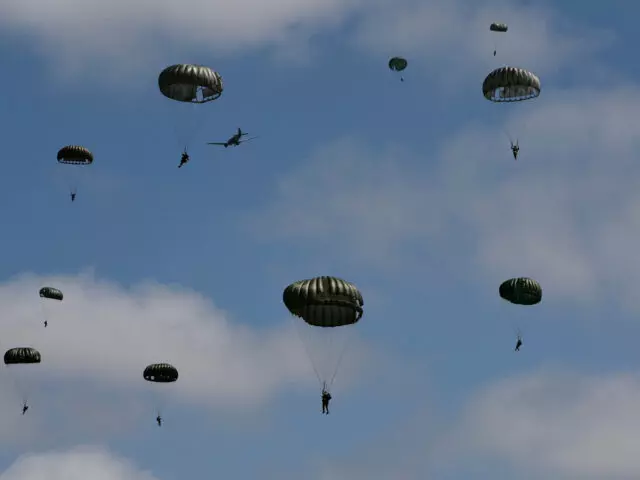Carentan-Les-Marais, France (AP) – Parachutists jumping from World War II-era planes hurled themselves Sunday into now peaceful Normandy skies where war once raged, heralding a week of ceremonies for the fast-disappearing generation of Allied troops who fought from D-Day beaches 80 years ago to Adolf Hitler’s fall, helping free Europe of his tyranny.
All along the Normandy coastline – where then-young soldiers from across the United States, Britain, Canada and other Allied nations waded ashore through hails of fire on five beaches on June 6, 1944 – French officials, grateful Normandy survivors and other admirers are saying “merci” but also goodbye.
The ever-dwindling number of veterans in their late nineties and older who are coming back to remember fallen friends and their history-changing exploits are the last. Watching the southern England coastline recede Sunday through the windows of one of three C-47 transport aircraft that flew him and other jumpers across the English Channel to their Normandy drop zone was like time-traveling back to D-Day for 63-year-old Neil Hamsler, a former British army paratrooper.
I thought that would have been the last view of England some of those lads of 1944 had,” he said. While theirs was a daytime jump Sunday, unlike for Allied airborne troops who jumped at night early on D-Day, and “no one’s firing at us,” Hamsler said: “It really brought it home, the poignancy.
Part of the purpose of fireworks displays, parades, and other events commemorating the 80th anniversary of D-Day is to remind younger generations of the sacrifices made by their forebears. Many veterans have expressed concern that their stories are being forgotten as time passes since World War II ended in 1945.
We did our job and we came home, and that’s it,” said another veteran, Ralph Goldsticker, a U.S. Air Force captain who served in the 452nd Bomb Group. I dropped my first bomb at 06:58 a.m. in a heavy gun placement. We went back home, we landed at 09:30. We reloaded.
Of the D-Day landings, he recalled seeing from his aircraft “a big, big chunk of the beach with thousands of vessels,” and spoke of bombing raids against German strongholds with routes that German forces might otherwise have used to rush in reinforcements to push the invasion back into the sea.
I want the younger people, the younger generation here to know what we did,” said Don Graves, a U.S. Marine Corps veteran who served in Iwo Jima in the Pacific theater. Seven thousand of my marine buddies were killed. Twenty thousand shot up, wounded, put on ships, buried at sea.
As these veterans gather to share their stories and pay tribute to their fallen comrades, they also hope to inspire future generations to never forget the sacrifices made during World War II. Their message is clear: war is hell, but it can also be a catalyst for change and progress if we learn from its lessons.

